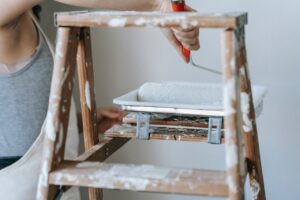
The 10 Most Common Mistakes Homeowners Make When Hiring A House Painter
Painting your home is a great way to refresh its look and increase its value, but finding the right painter can be a challenge. Hiring a professional who will deliver quality results is not as easy as it seems, and there are many common mistakes that homeowners make when selecting a painter. To help you avoid these pitfalls, we have compiled a list of the 10 most common mistakes homeowners make when hiring a house painter, along with practical tips to help you make the best choice for your home. From verifying a painter’s credentials to setting a budget and demanding a thorough clean-up, each of the 10 mistakes listed in this article has the potential to compromise the quality and longevity of your painting project. This article will provide you with the information you need to make informed decisions and ensure that your painting project is a success. Let’s dive into the world of house painting and explore the most common mistakes homeowners make and how you can avoid them. 1. Verify A House Painter’s Credentials Before Hiring This simple check can protect you from hiring someone who is unqualified or has a history of poor workmanship. You can be sure that a painter has the training, experience, and insurance needed to finish your painting project to your satisfaction when you check their credentials. For example, a reputable painter will be licensed and insured, have references from satisfied customers, and have a portfolio of their work that you can review. Taking the time to verify a painter’s credentials may take a little extra effort, but it is well worth it to ensure the quality of your painting project and the safety of your home. Don’t take any chances when it comes to your biggest investment, make sure to verify a painter’s credentials before hiring. 2. The Importance Of Choosing A Local House Painter Local painters are more likely to have a deep understanding of the weather patterns and environmental factors that can affect the longevity of a paint job, and they will be more accessible should you need them for any follow-up work. Working with a local painter can simplify the process of obtaining references and checking their credentials. For example, you can easily speak with neighbors and friends who have used the same painter and get their first-hand experience. In addition, local painters often have a better understanding of local building codes and regulations, ensuring that your painting project will meet all requirements. Choosing a local painter is not only good for your community, but also for your peace of mind and the success of your painting project. 3. The Benefits Of Setting A Financial Plan For Your House Painting Project Having a clear understanding of your budget not only helps you make informed decisions about the scope of your project but also helps you avoid any unexpected costs or surprises down the road. By setting a budget, you can determine the amount of money you are willing to spend on materials, labor, and any additional expenses. This will allow you to make informed choices about the quality of materials and the level of experience of the painter you hire. For example, if you have a limited budget, you may opt for a less expensive paint brand, or choose a painter who offers competitive rates without sacrificing quality. On the other hand, if you have a larger budget, you may opt for higher-quality paint and a more experienced painter. By setting a financial plan, you can ensure that your painting project stays within your budget and meets your expectations for quality and longevity. 4. Why Hiring The Cheapest House Painter May Cost You More In The Long Run Hiring the cheapest house painter may seem like a good idea at first, but it can actually end up costing you more in the long run. Cheaper painters often cut corners to keep their costs low, which can result in a lower-quality paint job that requires additional touch-ups or even a complete redo. In addition, these painters may use lower-quality materials or take shortcuts that can affect the longevity of the paint job. For example, if a painter does not properly prepare the surface before painting, the paint may peel or chip much sooner than it should. Furthermore, if a cheaper painter is not insured, you could be held liable for any accidents that occur on your property during the painting process. On the other hand, hiring a more experienced and professional painter may cost more initially, but the investment will pay off in the long run with a high-quality, long-lasting paint job that adds value to your home. Don’t compromise on quality for a lower price, because in the end, it may end up costing you more. 5. The Consequences Of Hiring An Inexperienced House Painter Hiring an inexperienced house painter can have serious consequences for the appearance and value of your home. A lack of experience can result in improper technique, leading to drips, streaks, and an uneven finish. Not only does this detract from the aesthetic of your home, but it can also lower its overall value. In addition, inexperienced painters may not have the necessary knowledge of proper surface preparation, leading to paint that chips, peels, and fades quickly. This not only looks unsightly, but it also requires additional time and expense to fix. To ensure a smooth, beautiful, and long-lasting paint job, it’s essential to hire a seasoned professional with a proven track record of quality work. Don’t let the consequences of a subpar paint job linger – choose an experienced painter for a stunning transformation of your home. 6. Clearly Define Your House Painting Requirement When it comes to painting your house, clarity is key. Defining your requirements upfront will ensure that the job is done to your satisfaction and avoid any miscommunication and dissatisfaction down the line. For example, consider specifying the type of paint you prefer, whether it be matte, gloss,





